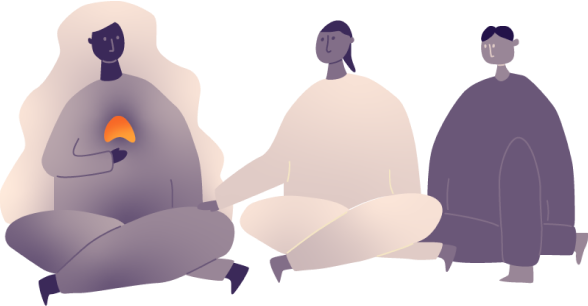Awhi is still in development, we'd love your feedback and suggestions. Let us know.
What to do if your child gets Covid 19
What to do if your taitamaiti or pēpē gets Covid 19
First – Don’t panic. This isn’t your fault. Omicron is highly contagious.
If your taitamaiti hasn’t been tested but they’re showing the following symptoms – stay home until they have been tested. Call the Covid 19 line 0800 358 5453 to get a test.
Symptoms of Covid 19
- Fever
- Cough
- Trouble breathing
- Gastrointestinal problems - sore tummy, nausea, vomiting, and diarrhoea
- Headaches
- Muscle aches
- Loss of taste and smell
- Cold symptoms e.g sore throat and/or sneezing
Omicron is a weird virus – some tamariki will get very sick, some tamariki won’t have any symptoms at all. Some tamariki will have symptoms caused by inflammation throughout the body, sometimes several weeks after they contracted Covid 19. This is called multisystem inflammatory syndrome (MIS-C). If your taitamaiti develops MIS-C they will be treated at the Children’s Hospital or in the ICU (intensive care unit).
Testing
If you think your taitamaiti has symptoms of COVID-19, call your GP or the Covid line on 0800 358 5453. They will give you the most up-to-date information on testing.
Tamariki should be tested if symptomatic and present with either typical or atypical symptoms. Contact your GP or your local testing centre to organise a PCR or RAT test. PCR tests will be used for people who need it most, and rapid antigen tests (RATs) will become more widely available. When you go for a test, the testing centre will let you know which test — RATs or PCR is best for you. Positive RAT results do not need to be confirmed with a PCR test unless advised.
If your taitamaiti tests positive for Covid 19
You must isolate with them for 10 days. You will be sent a link to complete an online form, which will help identify locations you have visited and people you have come into close contact with.
After 10 days, and if you are free of COVID-19 symptoms, you will be free to leave isolation. You do not need a negative test. If any member of your household tests positive for Covid 19, the 10 days begins again.
How to isolate with your Covid 19 positive taitamaiti
If possible, isolate with your taitamaiti and ONE parent or caregiver in another room from the rest of the whānau. Wash your hands often. Wash doorknobs and surfaces. Wear an n95 mask as often as possible. Keep windows open to help with air flow and ventilation. If you’re hapū, see if you can have another caregiver or parent look after your tamariki so you can limit contact.
If you have a high-risk adult or taitamaiti in your whare, consider having them isolated in another room, another area of the whare, or at another family member or friend’s whare. If this isn’t possible, they should always wear a mask and limit interactions as much as possible.
Keep other people and pets in the house away from your child as much as possible.
If you can, have your sick taitamaiti use a different bathroom from others. If that isn't possible, wipe down the bathroom often.
High risk means –
- Unvaccinated
- Immunocompromised either from disease or medications
- 65 years old and older
- Hapū / pregnant
- Chronic lung disease including moderate to severe uncontrolled asthma, BPD from prematurity, Interstitial lung disease, Pulmonary hypertension, COPD
- Heart Conditions
- Chronic kidney or liver disease
- Dementia
- Diabetic
- Down Syndrome
- Smoker/Vaper
If a high-risk person in your whānau gets Covid 19 contact their specialist or hospital care team immediately.
If your whānau gets Covid 19 despite taking precautions – remember, it’s very contagious. It’s not your fault. Be kind and gentle with yourself.
How to look after your Covid 19 positive child
You’ve got this. Stay calm. It’s likely your pēpē has been sick before, and you’ve been able to handle it. Covid 19 is no different.
- Keep them well-hydrated.
- Monitor nappies and wees to make sure they’re drinking enough.
- Don’t worry if they’re not hungry.
- Rest often. Use Panadol for fevers._ Some tamariki might struggle with oral paracetamol if they have a sore throat. Ask your pharmacist or doctor about rectal paracetamol._
- Use nasal suction or steam.
Make sure they rest as much as possible – screen time is fine!
Keep a close eye on their breathing – if they have any pauses in breathing, seem to be straining to breathe or have irregular or fast breathing, or if they’re too out of breath to talk or are out of breath after walking or if they turn blue or faint – call 111 immediately.
When to get help
If your child has a disability or is high risk – contact your paediatrician or care team as soon as they’re diagnosed.
If your child does not have a disability, is vaccinated and is not high risk take them to hospital or after-hours if:
- your child looks really unwell – you’re their parent, trust your instincts.
- they are confused or very sleepy
- they have chest pain
- they are cold, sweaty, pale or have blotchy skin
- they are dizzy
- they have very bad belly pain
Look for contractions on their chest, like pulling in between the ribs or the nostrils puffing with their breathing. If they have breathing problems: go to hospital.
If you’re not sure – call the dedicated COVID-19 Healthline, 24 hours a day, 7 days a week for free on 0800 358 5453
Again: Call 111 immediately – if your child has any pauses in breathing, seem to be straining to breathe or have irregular or fast breathing, or if they’re too out of breath to talk or are out of breath after walking or if they turn blue or faint.
Self-care
This is a scary time for you as a parent. Remember to fill your cup if you can. Talk to your friends by phone and ask for help with deliveries of groceries.
Be kind and gentle to yourself. Consider this karakia by Mero Irihapeti to protect your heart as you care for your tamariki and whānau.
Hā ki roto | Breathe in
Hā ki waho | Breathe out
Kia tau te mauri e kokiri nei | Settle the mauri that stirs inside of me
I nga piki me ngā heke | Through the ups and the downs
Ko te rangimarie tāku e rapu nei | It is peace that I seek
Tihei mauri ora

Emily Writes
I'm Emily Writes. I'm a parent to two incredible kids and I live in Wellington. My children and the families I met on the children's ward radicalised me! I realised I wanted to devote my life to creating and supporting communities as I truly believe we are stronger together. Awhi is very precious to me and I can't wait to work with you to make it a safe place to land for all parents.
Was this resource helpful to you?


The Awhi Ngā Mātua team would like to thank Takai, the IHC Foundation and the Dines Family Charitable Trust for their generous contributions to our work. A huge thank you also to the IHC Programmes team, in particular the IHC Library which has worked so hard to make their remarkable collection available to us.









